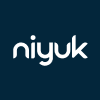Everything About Preparation for an AI Interview
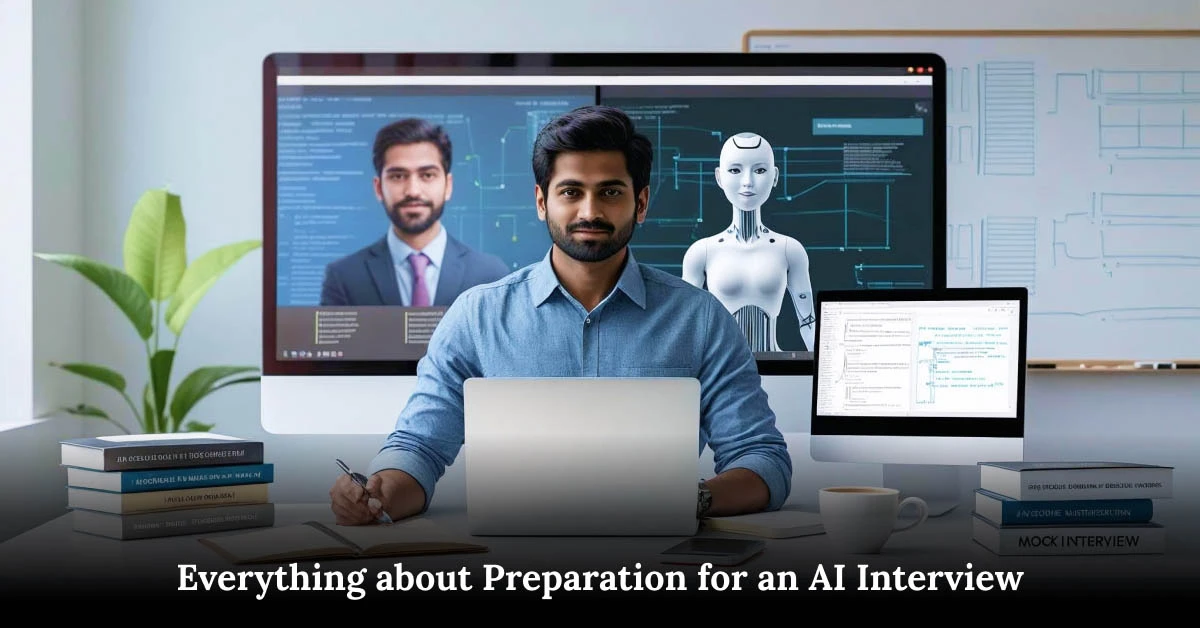
Are you looking for a job that pays six figures and is almost recession-proof? Businesses are vying for the best AI engineers and machine learning specialists. Over the past seven years the number of AI job postings with AI interview have increased by 450 %. At firms like OpenAI and Google DeepMind top AI engineers make over $300000 and occasionally millions with stock options.
Companies that are implementing AI frameworks, anticipate a change in the demand for workers with positions related to AI potentially expanding by up to 25% yearly according to a McKinsey report.
AI employment is growing but getting hired for these positions is not simple. Candidates must address difficult algorithmic problems deep learning architecture discussions and applied problem-solving in actual AI scenarios during AI and machine learning interviews.
So, how one can get prepared for an AI interview? What’s the structure of these AI job interviews? Which interview skills should you master? Are AI interviews like software engineering ones?
Using insights and analysis from multiple real-world AI-focused interviews at high-growth startups research labs and MAANG companies this blog breaks down the AI interview process to give you a competitive edge over your peers in your next job interview.
Most Required Guidelines on Preparation for an AI Interview
Applying AI-related keywords on your resume is not just sufficient to acquire an AI job.
You also need to display that you can use AI concepts to solve real-world business issues. Hiring managers, recruiters look for candidates who can write effective code, think critically and keep up with the most recent developments in artificial intelligence. The secret is to get ready for an AI interview is to combine technical know-how with practical projects and good communication.
These seven tips will help you can land your ideal job with required confidence.
1. Acquire the Essentials to Succeed in an Interview
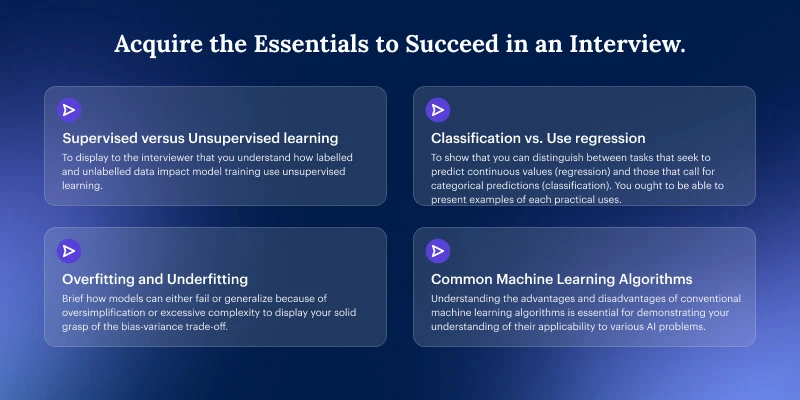
It is important to have a powerful foundation in AI and machine learning concepts. Frequently interviewers assess basic knowledge before getting deeply in intricate subjects.
A thorough understanding of key terms like these will help you answer interview questions.
- Supervised versus Unsupervised learning
To display to the interviewer that you understand how labelled and unlabelled data impact model training use unsupervised learning. - Classification vs. Use Regression
To show that you can distinguish between tasks that seek to predict continuous values (regression) and those that call for categorical predictions (classification). You ought to be able to present examples of each practical uses. - Overfitting and Underfitting
Brief how models can either fail or generalize because of oversimplification or excessive complexity to display your solid grasp of the bias-variance trade-off. - Common Machine Learning Algorithms
Understanding the advantages and disadvantages of conventional machine learning algorithms is essential for demonstrating your understanding of their applicability to various AI problems.
2. Practice Coding through Real-World AI Projects

Building your Python programming skills which are the industry standard for AI development is the first step in a systematic approach to AI interview preparation. You can start by creating and optimizing a basic LLM model putting in place a simple neural network writing functions to calculate precision recall and F1-score and using Pandas and NumPy to manipulate LLM datasets.
You get a competitive edge from this practical experience which also helps you develop a strong portfolio and confidence that will probably stick with interviewers.
To assess your algorithmic thinking and problem-solving abilities many AI interviews include various coding challenges. You should concentrate on using your knowledge through practical AI and ML projects rather than just solving individual coding problems.
By working on end-to-end AI and machine learning projects you can use the third-party platform to obtain practical experience with real datasets AI tools and frameworks and real-world use cases.
Make the most of Github to work on open-source projects and explore different well-organized well-liked free AI codebases to complete various tasks. Take part in Kaggle AI competitions work with datasets and become an expert in feature engineering model training and data pre-processing.
3. Get Well Versed Yourself with Latest AI Tools and Libraries
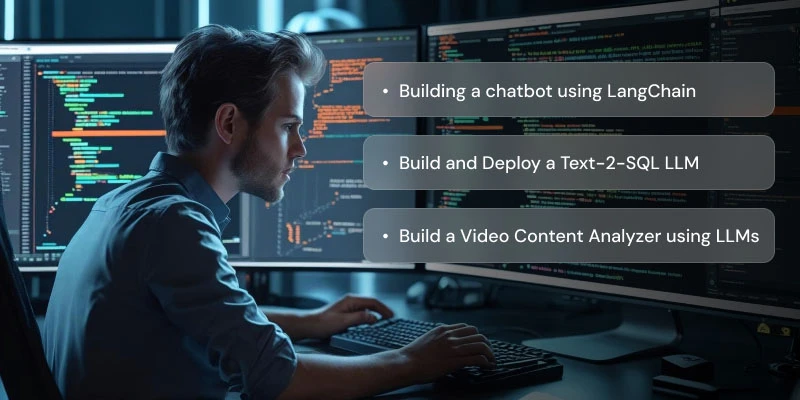
You must familiarize yourself with widely used AI tools and libraries because AI interviews emphasize applying your knowledge more than theoretical knowledge.
You ought to be able to use Hugging Face Transformers to enhance complex NLP models like BERT and GPT in addition to learning how to develop AI applications with LangChain.
Knowledge of TensorFlow and PyTorch is necessary when training and optimizing models with deep learning structures. You can use AI capabilities in your projects with proficiency with the OpenAI API. Also, you can effectively communicate insights with the use of Matplotlib and Seaborn for visualization.
Instead of just referring theory about these tools and frameworks, it is vital to start building projects using one or more of these tools!
Begin by working on projects like
- Building a chatbot using LangChain
- Build and Deploy a Text-2-SQL LLM
- Build a Video Content Analyzer using LLMs
Because AI interviews place a greater emphasis on applying your knowledge than on theoretical knowledge. You should become familiar with commonly used AI tools and libraries. Along with learning how to create AI applications with LangChain you should be able to use Hugging Face Transformers to improve intricate NLP models like BERT and GPT.
As industry standards TensorFlow and PyTorch are essential to understand when training and optimizing models with deep learning architectures. By being skilled with the OpenAI API and using Matplotlib and Seaborn for visualization you can use AI capabilities in your projects and effectively convey insights.
Looking for the Ultimate Guide?
Discover the best strategies for AI for interview preparation.
4. Construct a Thorough Project Walkthrough
If you have made several projects and put them in your portfolio. You should be keen to describe each one in detail. Interviewers can ask you about a specific project from the portfolio to gauge your approach for problem-solving technical proficiency and practical result. You should be able to give a thorough explanation of the project.
- Which practical issues were addressed by your project?
- Which pre-processing steps were necessary how did you source the data and what type of data did you use?
- Why did you select frameworks AI tools or LLM models?
- What diversions, issues did you face and how did you overcome from them?
- What did you get and what effect did your project have?
Specifically, if you are a recent graduate with zero work experience, it is vital that you give a complete explanation of your projects.
5. Stay Updated on AI Developments for a Successful Interview.
It is important to remain current and informed about the latest developments in AI including new model’s tools with emerging research.
Your knowledge will be groomed, and you’ll be able to appear for the interview with confidence. Read research articles on sites to learn about new diffusion models transformer architectures and techniques.
The best way to get better at AI interviews is to learn from real-world success stories. Gaining a deeper understanding of AI’s ROI value real-world applications and emerging trends through the listening of various AI podcasts like the AI Monetization Podcast can help you in interviews.
6. Refresh and Reinforce your Foundation in Mathematics
Machine learning and deep learning models are built on mathematics so being well-versed in the subject is crucial for success in interviews. Calculus (derivatives gradients chain rule) for optimization techniques like backpropagation linear algebra (vectors matrices eigenvalues SVD) for neural network computations and probability and statistics (Bayesian probability distributions hypothesis testing) for model evaluation and uncertainty estimation are all commonly evaluated by interviewers.
Applying these concepts to real-world AI projects instead of learning formulas will help you ace technical questions and demonstrate your problem-solving skills in practical settings.
7. Get Ready for Open-Ended Questions
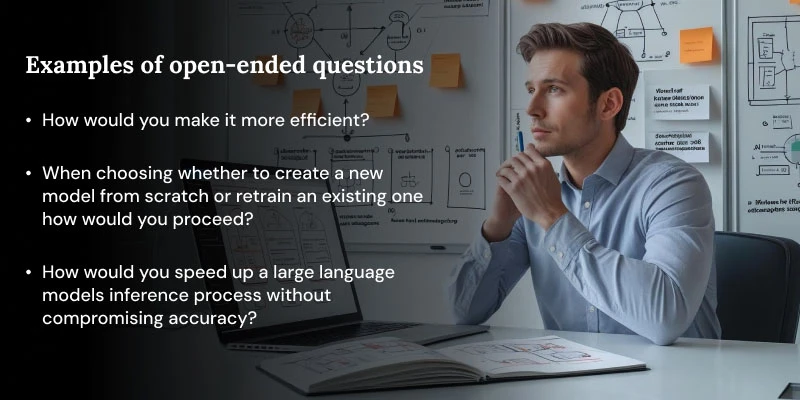
To assess your ability to develop refine and apply AI solutions in business contexts open-ended questions are frequently used in the hiring process. Employing managers can use these questions to gauge your capacity to break down complex problems defend model decisions and adjust strategies in response to constraints like data or computational efficiency.
For example, model selection (e. g. 3. when to use transformers as opposed to. Managing bias in datasets optimizing large-scale AI systems and using traditional machine learning model’s interviewers seek out systematic reasoning from candidates rather than a definitive response to the question.
Hiring managers may evaluate your approach to problem-solving reasoning and capacity to convert AI concepts into practical applications.
This is like how effective communication skills allow AI engineers to explain their strategies to stakeholders and assure that solutions match business objectives. You must always answer using a methodical approach like the STAR (Situation Task Action Result) method.
Examples of open-ended questions are provided here.
- How would you make it more efficient?
- When choosing whether to create a new model from scratch or retrain an existing one how would you proceed?
- How would you speed up a large language models inference process without compromising accuracy?
Although following these guidelines will give you a solid start and is only half the fight won (technical expertise and skills) by themselves are insufficient in the hiring environment driven by AI.
Now, businesses frequently use AI-based video interviews for candidates screening prior to a human interviewer.
It is essential to prepare by understanding how these systems work and how to effectively present yourself.
AI Mock Interview: Your Powerful Tool for Interview Success

These Interviews help job seekers to enhance their resumes, sharpen their responses and practice resolving AI-related problems under stressful conditions.
If you are getting ready for an AI job interview but are feeling interview anxiety, what if you have an AI-powered interview coach helping you to take practice interviews to polish your answers and give you immediate review to make sure that you are fully prepared!
The Concept: AI Mock Interviews
AI mock video interviews use AI tools to evaluate job seekers’ responses to custom AI interview questions based on the position’s job description to develop confidence. These tools assess communication skills, analyse behavioural and technical question responses, and offer instant feedback on aspects like speech clarity, tone, and confidence.
AI mock interviews can be your secret key for getting an advantage over other top applicants. AI-powered mock interviews assess your technical and behavioural skills by simulating real-world situations using the most recent AI models and giving constructive criticism to help you get better. AI interview tools have become a vital component of the hiring process and your success in the interview can be seriously impacted by your comprehension of how these AI mock interviews operate and how to perform well in them.
Don’t just Practice, Prepare Smarter.
Use Interview Preparation AI Tools to your Advantage.
Why Should You Try AI-Powered Mock Interviews?
These interviews offer a methodical way to address possible interview questions that are frequently asked in prestigious organizations assisting you in practicing confidently and clearly responding to challenging questions. Some AI-powered mock interview platforms employ an AI interview copilot to assess keywords, voice modulation and face expressions.
You can adapt your responses to meet hiring managers expectations by knowing where you need to improve with immediate feedback based on your responses. With AI mock interviews you can save time and get professional advice to ensure that you are ready and confident when you face a real interview panel.
Tip: To prevent AI misinterpretation, ensure that your setup is optimized for AI Interview Analysis by having the right lighting and a clutter free background.
Additionally, for AI tools to evaluate your voice modulation and fluency make sure you speak with confidence and clarity.
How Niyuk is the best solution for AI interviews?
Niyuk is a platform that transforms hiring practices for businesses through an intelligent system. It’s a cutting-edge method of using AI in interviews that benefits the company and the job applicant.
1. For Companies
Businesses find that Niyuk’s system greatly streamlines the hiring process particularly when conducting numerous interviews. The platform enables you to handle numerous applicants at once rather than manually scheduling innumerable interviews. It saves a great deal of time by recording their responses and automatically offering insights into their abilities and behaviour. Businesses can quickly concentrate on the most promising candidates thanks to the systems astute evaluation.
2. For the Candidates
It’s the interview itself and not an AI Interview preparation tool. The platform will be used to record your responses to questions posed by a business. Once you’re done, the employer will review your performance using the system’s intelligent technology. This is a reality.
Conclusion
As mentioned in the article, cracking an AI interview is not just theoretical knowledge – you need hands-on practical (project) experience and the ability to articulate your problem-solving approach without any fear. With Niyuk, you’re not just preparing for answers – you’re developing the right confidence and skills to stand apart in any AI job interview.
For such information and queries related to AI Interviews you may drop an email to our Niyuk experts on: info@niyuk.ai
Frequently Asked Questions
1. How is an AI interview different from a traditional interview?
An AI interview is different because you’re not talking to a person; you’re talking to a camera. A traditional interview is a direct, two-way conversation with a human recruiter. However, in a modern AI in the interview process, a computer program records your video and audio, and then analyses your answers, voice, and even expressions. While it may feel odd at first, it acts as a real time interview assistant to capture your responses consistently.
2. What skills do AI interview platforms typically assess?
These sites are made to look at more than just the words you use. Usually, they evaluate your communication style considering your self-assurance speech clarity and response structure. When preparing for an AI interview pay attention to both your speech and your delivery. You can even use an interview preparation AI to practice, as these systems give you a chance to refine your delivery before the real thing.
3. Can AI interviews be biased?
Yes, they may be. Although AI aims to be objective during the interview process the systems are trained on data which may have unspoken biases. If a specific group was used to train the program it may inadvertently favour people who speak or behave in a particular manner. Good AI for interview preparation is the best way to combat this since it boosts your confidence and lets your individuality show.
